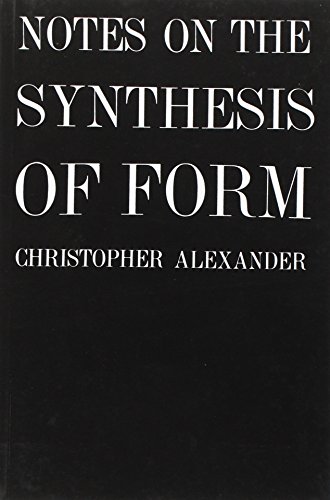notes synthesis form von christopher alexander (35 Ergebnisse)
Suchfilter
Produktart
- Alle Product Types
- Bücher (35)
- Magazine & Zeitschriften (Keine weiteren Ergebnisse entsprechen dieser Verfeinerung)
- Comics (Keine weiteren Ergebnisse entsprechen dieser Verfeinerung)
- Noten (Keine weiteren Ergebnisse entsprechen dieser Verfeinerung)
- Kunst, Grafik & Poster (Keine weiteren Ergebnisse entsprechen dieser Verfeinerung)
- Fotografien (Keine weiteren Ergebnisse entsprechen dieser Verfeinerung)
- Karten (Keine weiteren Ergebnisse entsprechen dieser Verfeinerung)
- Manuskripte & Papierantiquitäten (Keine weiteren Ergebnisse entsprechen dieser Verfeinerung)
Zustand Mehr dazu
Weitere Eigenschaften
- Erstausgabe (2)
- Signiert (Keine weiteren Ergebnisse entsprechen dieser Verfeinerung)
- Schutzumschlag (3)
- Angebotsfoto (14)
- Keine Print-on-Demand Angebote (35)
Sprache (2)
Gratisversand
Land des Verkäufers
Verkäuferbewertung
-
EUR 28,31
EUR 4,75 für den Versand von Vereinigtes Königreich nach USAAnzahl: 15 verfügbar
In den WarenkorbPAP. Zustand: New. New Book. Shipped from UK. Established seller since 2000.
-
Zustand: New.
-
Notes on the Synthesis of Form
Verlag: Harvard University Press, US, 1964
ISBN 10: 0674627512 ISBN 13: 9780674627512
Sprache: Englisch
Anbieter: Rarewaves.com USA, London, LONDO, Vereinigtes Königreich
EUR 33,08
Kostenlos für den Versand von Vereinigtes Königreich nach USAAnzahl: Mehr als 20 verfügbar
In den WarenkorbPaperback. Zustand: New. "These notes are about the process of design: the process of inventing things which display new physical order, organization, form, in response to function." This book, opening with these words, presents an entirely new theory of the process of design.In the first part of the book, Christopher Alexander discusses the process by which a form is adapted to the context of human needs and demands that has called it into being. He shows that such an adaptive process will be successful only if it proceeds piecemeal instead of all at once. It is for this reason that forms from traditional un-self-conscious cultures, molded not by designers but by the slow pattern of changes within tradition, are so beautifully organized and adapted. When the designer, in our own self-conscious culture, is called on to create a form that is adapted to its context he is unsuccessful, because the preconceived categories out of which he builds his picture of the problem do not correspond to the inherent components of the problem, and therefore lead only to the arbitrariness, willfulness, and lack of understanding which plague the design of modern buildings and modern cities.In the second part, Mr. Alexander presents a method by which the designer may bring his full creative imagination into play, and yet avoid the traps of irrelevant preconception. He shows that, whenever a problem is stated, it is possible to ignore existing concepts and to create new concepts, out of the structure of the problem itself, which do correspond correctly to what he calls the subsystems of the adaptive process. By treating each of these subsystems as a separate subproblem, the designer can translate the new concepts into form. The form, because of the process, will be well-adapted to its context, non-arbitrary, and correct.The mathematics underlying this method, based mainly on set theory, is fully developed in a long appendix. Another appendix demonstrates the application of the method to the design of an Indian village.
-
Zustand: Good. Used book that is in clean, average condition without any missing pages.
-
Zustand: As New. Unread book in perfect condition.
-
PAP. Zustand: New. New Book. Shipped from UK. Established seller since 2000.
-
Notes on the Synthesis of Form (Revised)
Verlag: Harvard University Press January 1964, 1964
ISBN 10: 0674627512 ISBN 13: 9780674627512
Sprache: Englisch
Anbieter: Eighth Day Books, LLC, Wichita, KS, USA
Paper Back. Zustand: New.
-
Notes on The Synthesis of Form
Verlag: Harvard University Press, Printed in USA, 1964
ISBN 10: 0674627512 ISBN 13: 9780674627512
Sprache: Englisch
Anbieter: Acadia Art & Rare Books. Est. 1931, Toronto, ON, Kanada
Zustand: Near Fine. Softcover. 8vo. 216pp. Illustrations in b/w. Slight wear to covers. Clean and unmarked interior.
-
Notes on the Synthesis of Form (Paperback)
Verlag: Harvard University Press, Cambridge, Mass, 1964
ISBN 10: 0674627512 ISBN 13: 9780674627512
Sprache: Englisch
Anbieter: Grand Eagle Retail, Bensenville, IL, USA
Paperback. Zustand: new. Paperback. "These notes are about the process of design: the process of inventing things which display new physical order, organization, form, in response to function." This book, opening with these words, presents an entirely new theory of the process of design.In the first part of the book, Christopher Alexander discusses the process by which a form is adapted to the context of human needs and demands that has called it into being. He shows that such an adaptive process will be successful only if it proceeds piecemeal instead of all at once. It is for this reason that forms from traditional un-self-conscious cultures, molded not by designers but by the slow pattern of changes within tradition, are so beautifully organized and adapted. When the designer, in our own self-conscious culture, is called on to create a form that is adapted to its context he is unsuccessful, because the preconceived categories out of which he builds his picture of the problem do not correspond to the inherent components of the problem, and therefore lead only to the arbitrariness, willfulness, and lack of understanding which plague the design of modern buildings and modern cities.In the second part, Mr. Alexander presents a method by which the designer may bring his full creative imagination into play, and yet avoid the traps of irrelevant preconception. He shows that, whenever a problem is stated, it is possible to ignore existing concepts and to create new concepts, out of the structure of the problem itself, which do correspond correctly to what he calls the subsystems of the adaptive process. By treating each of these subsystems as a separate subproblem, the designer can translate the new concepts into form. The form, because of the process, will be well-adapted to its context, non-arbitrary, and correct.The mathematics underlying this method, based mainly on set theory, is fully developed in a long appendix. Another appendix demonstrates the application of the method to the design of an Indian village. "These notes are about the process of design: the process of inventing things which display new physical order, organization, form, in response to function." This book, opening with these words, presents an entirely new theory on the process of design. Shipping may be from multiple locations in the US or from the UK, depending on stock availability.
-
EUR 34,79
EUR 5,50 für den Versand von Italien nach USAAnzahl: Mehr als 20 verfügbar
In den WarenkorbZustand: new.
-
Hardcover. Zustand: Good. No Jacket. Ninth printing. Shelf and handling wear to cover and binding, with general signs of previous use. No notes, inscriptions or underlining to text. Secure packaging for safe delivery.
-
Notes on the Synthesis of Form (Harvard Paperbacks)
Anbieter: Revaluation Books, Exeter, Vereinigtes Königreich
EUR 35,54
EUR 11,41 für den Versand von Vereinigtes Königreich nach USAAnzahl: 2 verfügbar
In den WarenkorbPaperback. Zustand: Brand New. later pr. edition. 224 pages. 8.25x5.50x0.75 inches. In Stock.
-
Notes on the Synthesis of Form (Harvard Paperbacks)
Anbieter: Ria Christie Collections, Uxbridge, Vereinigtes Königreich
EUR 33,38
EUR 13,67 für den Versand von Vereinigtes Königreich nach USAAnzahl: 2 verfügbar
In den WarenkorbZustand: New. In.
-
EUR 29,77
EUR 17,12 für den Versand von Vereinigtes Königreich nach USAAnzahl: 2 verfügbar
In den WarenkorbZustand: New.
-
EUR 33,54
EUR 16,04 für den Versand von Vereinigtes Königreich nach USAAnzahl: Mehr als 20 verfügbar
In den WarenkorbPaperback / softback. Zustand: New. New copy - Usually dispatched within 4 working days.
-
EUR 42,90
EUR 7,42 für den Versand von Vereinigtes Königreich nach USAAnzahl: 3 verfügbar
In den WarenkorbZustand: New. pp. 224.
-
Zustand: New. pp. 224.
-
EUR 34,91
EUR 17,12 für den Versand von Vereinigtes Königreich nach USAAnzahl: 2 verfügbar
In den WarenkorbZustand: As New. Unread book in perfect condition.
-
Notes on the Synthesis of Form
Verlag: Harvard University Press 1971, 1971
Anbieter: Hard to Find Books NZ (Internet) Ltd., Dunedin, OTAGO, Neuseeland
Verbandsmitglied: IOBA
Octavo softcover (VG-); all our specials have minimal description to keep listing them viable. They are at least reading copies, complete and in reasonable condition, but usually secondhand; frequently they are superior examples. Ordering more than one book may reduce your overall postage costs.
-
Notes on the Synthesis of Form (Paperback)
Verlag: Harvard University Press, Cambridge, Mass, 1964
ISBN 10: 0674627512 ISBN 13: 9780674627512
Sprache: Englisch
Anbieter: CitiRetail, Stevenage, Vereinigtes Königreich
EUR 35,26
EUR 42,23 für den Versand von Vereinigtes Königreich nach USAAnzahl: 1 verfügbar
In den WarenkorbPaperback. Zustand: new. Paperback. "These notes are about the process of design: the process of inventing things which display new physical order, organization, form, in response to function." This book, opening with these words, presents an entirely new theory of the process of design.In the first part of the book, Christopher Alexander discusses the process by which a form is adapted to the context of human needs and demands that has called it into being. He shows that such an adaptive process will be successful only if it proceeds piecemeal instead of all at once. It is for this reason that forms from traditional un-self-conscious cultures, molded not by designers but by the slow pattern of changes within tradition, are so beautifully organized and adapted. When the designer, in our own self-conscious culture, is called on to create a form that is adapted to its context he is unsuccessful, because the preconceived categories out of which he builds his picture of the problem do not correspond to the inherent components of the problem, and therefore lead only to the arbitrariness, willfulness, and lack of understanding which plague the design of modern buildings and modern cities.In the second part, Mr. Alexander presents a method by which the designer may bring his full creative imagination into play, and yet avoid the traps of irrelevant preconception. He shows that, whenever a problem is stated, it is possible to ignore existing concepts and to create new concepts, out of the structure of the problem itself, which do correspond correctly to what he calls the subsystems of the adaptive process. By treating each of these subsystems as a separate subproblem, the designer can translate the new concepts into form. The form, because of the process, will be well-adapted to its context, non-arbitrary, and correct.The mathematics underlying this method, based mainly on set theory, is fully developed in a long appendix. Another appendix demonstrates the application of the method to the design of an Indian village. "These notes are about the process of design: the process of inventing things which display new physical order, organization, form, in response to function." This book, opening with these words, presents an entirely new theory on the process of design. Shipping may be from our UK warehouse or from our Australian or US warehouses, depending on stock availability.
-
paperback. Zustand: New. In shrink wrap. Looks like an interesting title!
-
Notes on the Synthesis of Form (Paperback)
Verlag: Harvard University Press, Cambridge, Mass, 1964
ISBN 10: 0674627512 ISBN 13: 9780674627512
Sprache: Englisch
Anbieter: AussieBookSeller, Truganina, VIC, Australien
Paperback. Zustand: new. Paperback. "These notes are about the process of design: the process of inventing things which display new physical order, organization, form, in response to function." This book, opening with these words, presents an entirely new theory of the process of design.In the first part of the book, Christopher Alexander discusses the process by which a form is adapted to the context of human needs and demands that has called it into being. He shows that such an adaptive process will be successful only if it proceeds piecemeal instead of all at once. It is for this reason that forms from traditional un-self-conscious cultures, molded not by designers but by the slow pattern of changes within tradition, are so beautifully organized and adapted. When the designer, in our own self-conscious culture, is called on to create a form that is adapted to its context he is unsuccessful, because the preconceived categories out of which he builds his picture of the problem do not correspond to the inherent components of the problem, and therefore lead only to the arbitrariness, willfulness, and lack of understanding which plague the design of modern buildings and modern cities.In the second part, Mr. Alexander presents a method by which the designer may bring his full creative imagination into play, and yet avoid the traps of irrelevant preconception. He shows that, whenever a problem is stated, it is possible to ignore existing concepts and to create new concepts, out of the structure of the problem itself, which do correspond correctly to what he calls the subsystems of the adaptive process. By treating each of these subsystems as a separate subproblem, the designer can translate the new concepts into form. The form, because of the process, will be well-adapted to its context, non-arbitrary, and correct.The mathematics underlying this method, based mainly on set theory, is fully developed in a long appendix. Another appendix demonstrates the application of the method to the design of an Indian village. "These notes are about the process of design: the process of inventing things which display new physical order, organization, form, in response to function." This book, opening with these words, presents an entirely new theory on the process of design. Shipping may be from our Sydney, NSW warehouse or from our UK or US warehouse, depending on stock availability.
-
Hardcover. Zustand: Good. Zustand des Schutzumschlags: Very Good. fourth printing 1967. slight edgewear to dj.
-
Notes on the Synthesis of Form
Verlag: Harvard University Press Jan 1964, 1964
ISBN 10: 0674627512 ISBN 13: 9780674627512
Sprache: Englisch
Anbieter: AHA-BUCH GmbH, Einbeck, Deutschland
Taschenbuch. Zustand: Neu. Neuware - 'These notes are about the process of design: the process of inventing things which display new physical order, organization, form, in response to function.' This book, opening with these words, presents an entirely new theory of the process of design.
-
Notes on the Synthesis of Form
Verlag: Harvard University Press, US, 1964
ISBN 10: 0674627512 ISBN 13: 9780674627512
Sprache: Englisch
Anbieter: Rarewaves.com UK, London, Vereinigtes Königreich
EUR 29,78
EUR 74,19 für den Versand von Vereinigtes Königreich nach USAAnzahl: Mehr als 20 verfügbar
In den WarenkorbPaperback. Zustand: New. "These notes are about the process of design: the process of inventing things which display new physical order, organization, form, in response to function." This book, opening with these words, presents an entirely new theory of the process of design.In the first part of the book, Christopher Alexander discusses the process by which a form is adapted to the context of human needs and demands that has called it into being. He shows that such an adaptive process will be successful only if it proceeds piecemeal instead of all at once. It is for this reason that forms from traditional un-self-conscious cultures, molded not by designers but by the slow pattern of changes within tradition, are so beautifully organized and adapted. When the designer, in our own self-conscious culture, is called on to create a form that is adapted to its context he is unsuccessful, because the preconceived categories out of which he builds his picture of the problem do not correspond to the inherent components of the problem, and therefore lead only to the arbitrariness, willfulness, and lack of understanding which plague the design of modern buildings and modern cities.In the second part, Mr. Alexander presents a method by which the designer may bring his full creative imagination into play, and yet avoid the traps of irrelevant preconception. He shows that, whenever a problem is stated, it is possible to ignore existing concepts and to create new concepts, out of the structure of the problem itself, which do correspond correctly to what he calls the subsystems of the adaptive process. By treating each of these subsystems as a separate subproblem, the designer can translate the new concepts into form. The form, because of the process, will be well-adapted to its context, non-arbitrary, and correct.The mathematics underlying this method, based mainly on set theory, is fully developed in a long appendix. Another appendix demonstrates the application of the method to the design of an Indian village.
-
Hardcover. Zustand: Fair. No Jacket. Readable copy. Pages may have considerable notes/highlighting. ~ ThriftBooks: Read More, Spend Less.
-
Hardcover. Zustand: Good. No Jacket. Pages can have notes/highlighting. Spine may show signs of wear. ~ ThriftBooks: Read More, Spend Less.
-
Taschenbuch. Zustand: Neu. Notes on the Synthesis of Form | Christopher Alexander | Taschenbuch | Einband - flex.(Paperback) | Englisch | Harvard University Press | EAN 9780674627512 | Verantwortliche Person für die EU: Libri GmbH, Europaallee 1, 36244 Bad Hersfeld, gpsr[at]libri[dot]de | Anbieter: preigu.
-
Notes on the Synthesis of Form
Verlag: Harvard University Press, Cambridge, MA, 1970
ISBN 10: 0674627504 ISBN 13: 9780674627505
Sprache: Englisch
Erstausgabe
Hardcover. Zustand: Good+. Zustand des Schutzumschlags: No Dust Jacket. First Edition; Fifth Printing. 215 pages; Ex-Library copy with usual identifiers. Slightly cocked spine. Good condition otherwise. No other noteworthy defects. No markings on text pages. ; - Your satisfaction is our priority. We offer free returns and respond promptly to all inquiries. Your item will be carefully cushioned in bubble wrap and securely boxed. All orders ship on the same or next business day. Buy with confidence.
-
Notes on the Synthesis of Form
Verlag: Harvard University Press
Anbieter: ThriftBooks-Dallas, Dallas, TX, USA
Hardcover. Zustand: Good. No Jacket. Pages can have notes/highlighting. Spine may show signs of wear. ~ ThriftBooks: Read More, Spend Less.


















